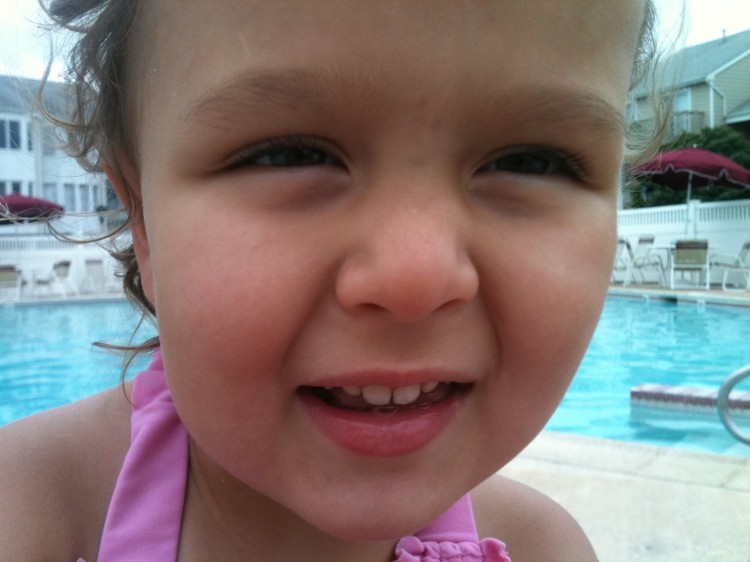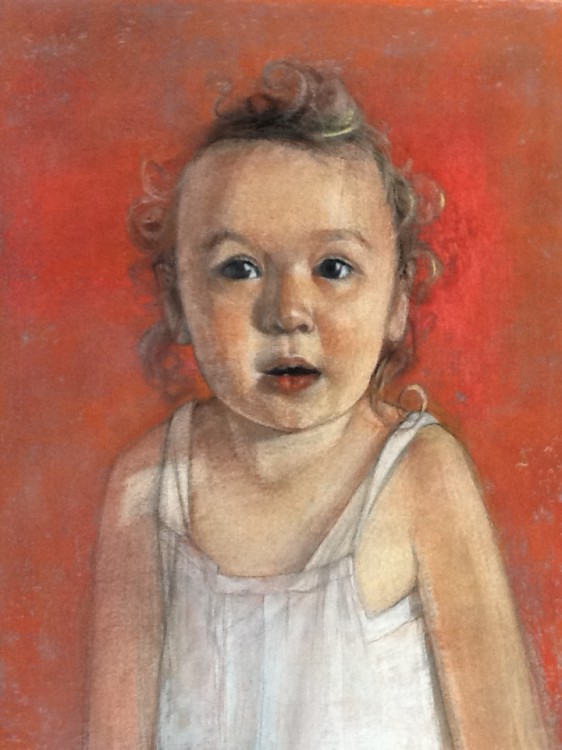When We Found Out Our Child Would Not Grow Up
 We all have our diagnosis stories. No matter how long ago it happened, every parent like me remembers the days their hopes and dreams for their children ceased to be true.
We all have our diagnosis stories. No matter how long ago it happened, every parent like me remembers the days their hopes and dreams for their children ceased to be true.
It was June 26, 2012 at 7:45 a.m. when a doctor and a social worker walked into a room at the Children’s Hospital of Philadelphia and told me my beautiful little girl, who had trouble keeping her balance and had stalled in learning to speak despite the therapists coming to our house, had late infant onset metachromatic leukodystrophy. There was nothing to be done, and Cal would eventually lose her ability to walk, speak, feed herself, hold up her head and see.
This disease will take Cal one day. Most kids with late infant onset metachromatic leukodystrophy don’t survive beyond their 5th birthdays, and Cal turned 5 on December 23, 2014. It was a diagnosis so grim it made you wish for a brain tumor.
The day I heard the word “leukodystrophy” for the first time, I was anything but brave. I wanted to leap out the window of the hospital. I collapsed on the floor. I cursed the nurses and the doctors. All the while, Cal, who was just 2, wanted to snuggle and read books and sing. When you learn your child won’t grow up, it’s astounding how quickly your old life ends. You mourn this old life as much as you grieve over your child’s prognosis. And, if I could go back in time — and I do from time to time when newly diagnosed parents email or write to ask for my help — I do my best.
I now get to tell versions of myself what I needed to hear that June. The first thing I say is that getting this news is terrible, the worst thing that can happen, and it will feel like you’re dying. But I promise you, you’re not. And after a while, once the shock of it gets absorbed into your system, you will put yourself back together and find that you’re superhuman. You will be astounded by your courage and clarity. Even though you will find you can do amazing things for your child, pace yourself, ask for help and understand the limits to your power. You must stop and find time for yourself and sleep and take a shower and leave the house. Surround yourself with people who can be there. You will be surprised by the people who are good at helping you and by the ones who are not. Forgive people for not being able to say or do the right thing.
You will need a sort of tunnel vision. Please don’t dwell on the life you dreamed of for your child. But take brief visits to your old life. Figure out what the disease or disability can’t take away, and create joy and fun around what is possible. For children with leukodystrophy, there’s so much pleasure to be found in sharing a story or a movie, having a bath and being around people who can engage with them on the right level.
This year we celebrated a birthday with a sing-along with all my daughter’s favorite songs. She laughed so hard she got the hiccups. It’s true she couldn’t open presents and eat cake, but it was still a celebration. Making a child comfortable, keeping away the pain and making her laugh and smile each day requires great effort, but, unlike before, you will take none of it for granted and you will be astounded at how much pleasure and comfort will be possible in things you hardly noticed in that old life.
I’m afraid you will be angry with yourself and the other parents who take it all for granted. Create lots of memories, take photos and don’t just use your phone — get a professional photographer or even an artist to paint a portrait of your child.
Your house may fill up with medical equipment, but these things will not make your home a hospital. The machines and medicines are there to help you give your child the best possible life. They are tools for you to do what you need to do.
Your child will reveal to you what’s required of you. If you can have the courage to be present, these children will teach you the meaning of life. But, no matter what the disease does, your child loves you and you love your child. Your child will be blessed to have parents who care so much. Your love will consume you, but it’s endless, so you will never run out of it. Love will be your secret weapon in all of this. Look for the beauty and joy.
 Our house is always filled with people, music and children, more so now than before Cal got sick. Please don’t hide. The room where my daughter spends the day is the center of life in our house. Her nurses are like our family, and we enjoy birthdays and Christmas and music and the Super Bowl just like anyone else… maybe even more than we did before.
Our house is always filled with people, music and children, more so now than before Cal got sick. Please don’t hide. The room where my daughter spends the day is the center of life in our house. Her nurses are like our family, and we enjoy birthdays and Christmas and music and the Super Bowl just like anyone else… maybe even more than we did before.
Create physical beauty and keep it close. Our house has a gorgeous painting of Cal and her sister hanging in the dining room created by the most wonderful artist. On the hospital bed where Cal sleeps is a beautiful handmade quilt, and in the living room, I have the book third graders at my son’s school created about Cal. These treasures will protect and inspire you.
Write a blog, find old friends, tell anyone who will listen you and your child’s story. The only way to endure grief is for it to become a story that you can tell yourself and others. And if you are comfortable, use social media to connect with the parents who are going through what you are.
Realizing you are not alone will save you.
Follow this journey at The Calliope Joy Foundation.
The Mighty is asking its readers this question: If you could go back to the day you (or a loved one) got a diagnosis, what would you tell yourself? If you’d like to participate, please send a blog post to community@themighty.com. Please include a photo for the piece, a photo of yourself and 1-2 sentence bio.
